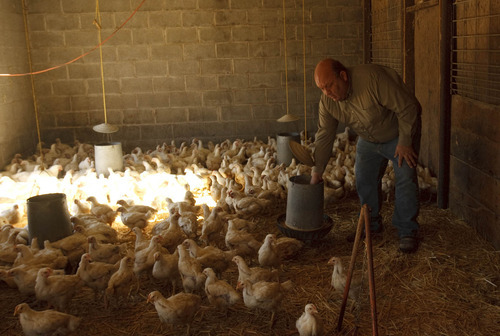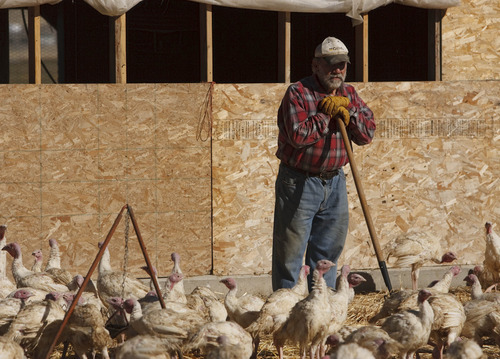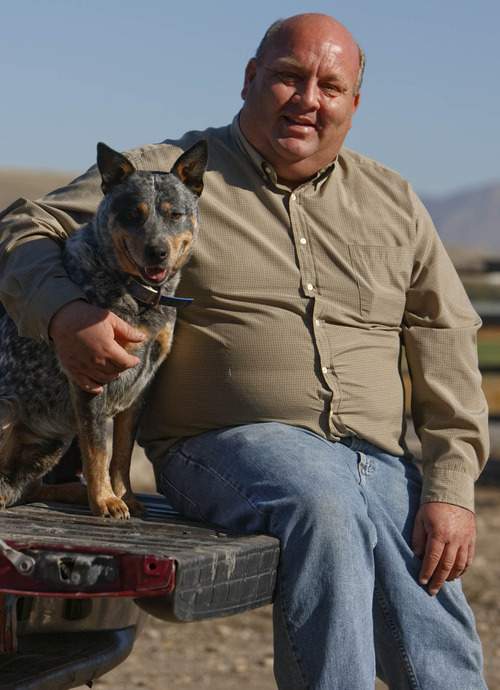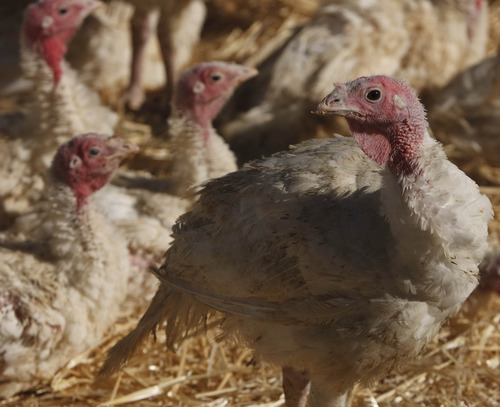This is an archived article that was published on sltrib.com in 2010, and information in the article may be outdated. It is provided only for personal research purposes and may not be reprinted.
Bothwell • Poultry gave Nels Anderson a second chance at a family farm.
Last fall, the organic onion farmer and his family lost their land and their homes, thanks to a combination of too much debt and a few bad business dealings. The only thing the Box Elder County clan had left — besides clothes and some furniture — was a flock of turkeys.
The family had originally planned to give the birds as gifts to neighbors and suppliers, but now they were forced to sell them for income.
Anderson contacted Slow Food Utah, hoping someone in the group might be interested in buying the locally-raised birds for Thanksgiving. Members gobbled them up faster than pumpkin pie.
"I had 180 turkeys and could have sold 500," said Anderson, 43. "I turned many people down who were looking for a fresh turkey."
He considered it a good omen, and immediately started plans for a new venture, Heritage Valley Poultry, which raises and sells chickens, ducks, rabbits and, of course, turkeys for Thanksgiving and Christmas.
Poultry sold straight from a farm constituted a niche market that hadn't yet been filled in Utah. Those who wanted to buy their meat straight from small farmers could easily find beef, pork and even lamb, but chicken or turkey were a more elusive kind of protein.
"Unless you had connections to people who raised poultry, it was pretty hard to find," said Gwen Crist, a leader with Slow Food Utah, who bought one of Anderson's first birds last fall. "Nels is really the first one to come on to the scene and be widely available."
A family affair • Anderson, a fifth-generation farmer, raises the birds in this small community just west of Tremonton, along with his wife, Mary, their two children, and his father Curtis. They rent a small facility — once used by the local 4-H groups — that allows them to process and sell the birds according to state standards. Poultry processing is something that hasn't been available for nearly four decades in Northern Utah, Anderson said.
In June, Anderson started selling his Cornish Cross chickens at the farmer's markets in downtown Salt Lake City, Sugar House and Park City. The first few weeks, he sold about two dozen. By the end of the summer, word had spread and Heritage Valley was selling more than 100 fresh chickens a week, Anderson said.
Besides chickens, Anderson also has raised some 5,000 Broad Breasted White turkeys. About half the flock is full-grown and will be processed and ready for sale in time for Thanksgiving. The remaining birds will grow for a few more weeks and then be processed for Christmas.
Now that the farmers markets have ended, Anderson plans to meet customer demand through a winter Community Supported Agriculture program. It starts this week and continues through March. (See info box). However, consumers don't have to be members of a CSA to get Heritage Valley poultry. They can call or e-mail Anderson to order. Besides whole chickens, Anderson sells packages of breasts, thighs, legs, wings and even liver for pate. Eventually, he hopes to offer ground turkey.
Unfortunately, buying locally raised poultry won't be an option for everyone because of the price, which is two-to-three times that of grocery-store bargains. Heritage Valley chicken is $4 a pound; turkey is $2.25 a pound, and rabbit and duck range from $6 to $7 a pound.
Meet your maker • Several of Utah's top restaurants buy Heritage Valley chicken on a regular basis, including Log Haven, Pago, Tin Angel and Bambara.
"Chicken is definitely one of those things you want to know where it's coming from, because sometimes it can come from not-so-pretty places," said Bambara chef Nathan Powers, who calls the product "a great chicken."
Heritage Valley birds aren't certified organic, but Anderson says he follows organic practices such as creating his own animal feed, which contains no animal byproducts or added hormones. It's simply a combination of ground corn and wheat — which Anderson grows— and purchased soybeans. "That allows me to know exactly what I'm feeding them," Anderson said.
They aren't "free-range" birds either. Instead, they are raised in large fenced pens, which keep them safe from predators that roam the valley. The pens are large enough that the birds can eat, drink, roam and sleep to their heart's content.
"If I don't take care of them, they won't grow," Anderson explained. "And if they don't grow, I can't sell them and make money. So I make it pleasant for them."
Back to the future • Raising poultry is really a return to the Anderson family's roots. Turkeys were a major industry in Box Elder County 70-plus years ago, and his grandfather raised thousands of them through the years.
"I remember feeding the turkeys as a young boy and hating the damn things," he said. Sometime in the 1970s, the Ogden plant where farmers took their birds to be processed closed down, marking an end to the turkey business in Northern Utah. Box Elder County farmers, such as the Andersons, switched to raising hay, grain, sugar beets and even corn for feed, while the state's commercial turkey became rooted in Sanpete County.
Through the years, Anderson and his family have raised a variety of crops, including butternut squash for baby food and organic onions.
Poultry wasn't ever part of his plan, even though Curtis Anderson, his father, had been suggesting it for years.
"For 20 years," Anderson said, "he's been telling me there's a market for poultry."
Heritage Valley poultry
What • Utah farmer Nels Anderson and his family raise and sell poultry from their Box Elder County farm. Chicken is $4 a pound; turkey is $2.25 a pound; rabbit and duck range from $6 to $7 a pound.
How to buy • Call Anderson at 435-770-2365 or e-mail mbanca@nebonet.com to place an order and arrange a meeting spot. He is usually in the Salt Lake Valley at least twice a week.
Join the CSA • Heritage Valley Poultry is now accepting memberships to its 20-week Community Supported Agriculture program that runs through March 24. Full- and half-shares are available for $380 and $190, respectively.
A full-share includes • 20 whole chickens (one each week) and a choice of two specialty animals (turkey, rabbit and duck.) The specialty animal can be ordered anytime during the 20 weeks.
A half-share includes • 10 whole chickens (1 every other week) and one specialty animal (turkey, rabbit or duck), which can be ordered anytime during the 20 weeks.









